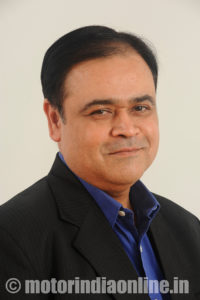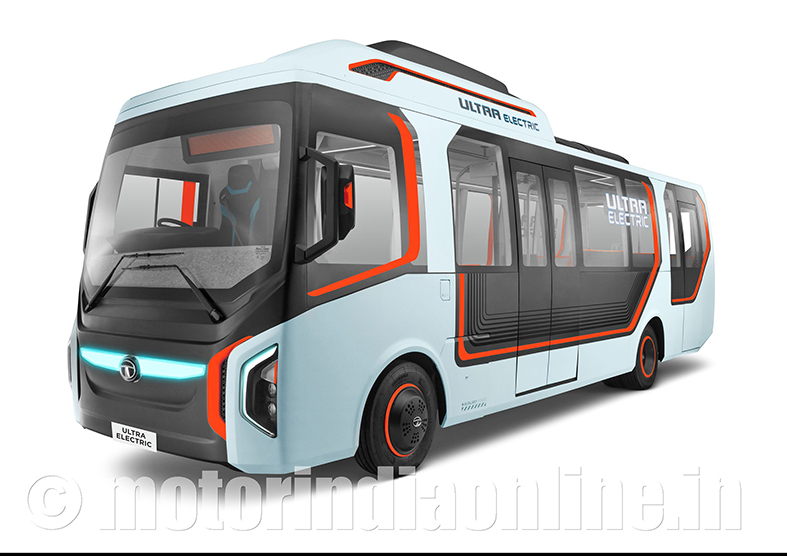Multi-pronged approach to drive bus business
Tata Motors has been working on different new bus models for quite some time now. Significant among those are powered by LNG and methane, the Ultra electric, Magna range and Starbus Hybrid buses. The company has also bagged big orders from STUs and has received enthusiastic response from the PPP framework. We got an exclusive update on the company’s new products, the current market scenario and future plans from Mr. Sandeep Kumar, Head – Sales and Marketing – Passenger, Commercial Vehicle Business Unit, Tata Motors.

Excerpts:
As one of the country’s largest bus manufacturers with the complete range of transit vehicles that meet every need, could you give us an update on the developments of Ultra bus, Ultra AMT, Marcopolo, the Magna range of buses for India and export markets, particularly in the new BS-IV regime?
On the domestic business, we are now ready with the production series for the Ultra AMT and around 10 buses have been provided to customers for user trials. The results are very encouraging and drivers in particular have appreciated the AMT technology as it has reduced fatigue and enhanced safety. From this quarter, we will ramp up our numbers, primarily in school and staff applications. In addition to this, we are also in discussion with city STUs for our AMT buses. Marcopolo and ACGL continue to be our preferred partners and we constantly keep introducing new products and variants through this partnership. The most recent launch is our ‘Magna Range’ which has received good response. In the North and West India, we have supplied 20-30 vehicles. Now we are converting and coming out with BS IV vehicles. We have received an order for 25 Magna from buses from the STU in Orissa, which we will be executing from next quarter.
On the export front, our ultra range of buses are successfully being sold in SAARC and Africa for the past 2 years. All our vehicles undergo thorough testing for 100,000 km in order to meet the specific market needs and we ensure continuous upgrades on features like the Low NVH, common rail engine, ABS, child safety for school buses to provide the best-in-class products to our customers. In addition to these, we also continue to make important market specific changes to meet emission, overall total operation cost and operating conditions related mandates for all our exports markets. Our Magna range of buses catering to the coach segment has been receiving good response in Nepal and Bangladesh.
Could you please elaborate on the orders commissioned from customers like STUs, private bus operators and share which vehicle categories of buses these orders fall under?
We are witnessing huge interest and development in PPP model. Apart from the regular STUs, we received an order for 1,200 buses from Maharashtra and Gujarat under the PPP framework. Overall STU buying has been lukewarm. Most of the major STUs are yet to finalize their orders and tenders. We have received BMTC 1000 Nos orders, West Bengal 215 Nos and Gujarat 316 Nos. Total STU order as on October 1, 2017, is about 1,800 Nos. However, the other big tenders are still in the pipeline. We have favorable response from Andhra Pradesh, Karnataka (BMTC) and are in discussion with other organizations as well.
How is the infrastructure development shaping up for the LNG- and methane-powered buses?
We are enthused by the response showed by IOC and LNG Petronet for using LNG as a fuel. The Ministry of Surface Transport has recently notified LNG as a fuel and clarified all norms pertaining to LNG as a fuel. We are in full support of energy fuel provides for the supply of buses. TML is the first company in India to showcase LNG buses. We will be supplying an introductory order of LNG buses in Gujarat and Kerala shortly. Tata Motors is also ready with a range of buses that can operate on Bio-CNG. This range is available not only in buses but also SCVs and LCVs. Wherever there is a requirement, TML is fully geared up to supply.
Please give us insight into the trials of the Tata Ultra Electric buses underway across the country.
Keeping the growing customer aspirations in mind, there is a latent need for a range of electric vehicles mobility solutions and we will partner with the industry in providing path breaking EV technologies. Our teams are working on various projects, are in the process of crafting a roadmap entailing specific short-term and long-term goals, and are making all the right investments to enable this. In commercial vehicles, we are ready for production and as a precursor to that, we are doing trials and the results for these trials are very encouraging, we have achieved very high degree of efficiency because of a very specific architecture which we have adopted. We are also working with various STUs and other stakeholders who are keen to introduce electric vehicles and we are in touch with them. We are hopeful that very soon we will be able to enter the market with the 9 meter, 12 meter and low floor full electric bus.
What’s the status of the Starbus Hybrid vehicles to be delivered to MMRDA Mumbai?
Out of the 25 buses order, we have already delivered 10 buses to MMRDA and are awaiting formal flag-off to ply on roads. We are also in touch with various other STUs including private parties for sale of these buses.
What else has Tata Motors been doing to improve its standing in the wake of challenging market conditions?
We have been market leaders in the CV segment with commercial vehicles being the backbone of our business. To reiterate our leadership in the CV segment, we have developed a comprehensive strategy to build on the leadership position, which involves new product interventions, investment planned across segments, technological development, structural initiatives to improve productivity and improving our topline contribution from exports. We are working on renewed focus and energy for a turnaround plan.
The most relevant method of staying on top of the market is through introducing new products which are relevant for the time and that’s what we are committed to and will continue to do.
How has business been on the school bus front?
As you are aware, the sale of school buses is seasonal, and right now the season has ended. The next school season will commence in February and we are fully geared to cater to the demands for school buses. We have a few product upgradations planned in the upcoming season – AC buses are becoming relevant in terms of school usage. Fleet management and tracking of the bus has been introduced to ensure safety of the child.
We also have a unique initiative called ‘Hamare Bus ki Baat Hai’ where we have successfully trained school staff over 2300 schools in India. We had designed this initiative was designed with the objective of sensitizing school bus staff, on the safety of children during school bus travel. The training program included sessions to train school bus staff on the importance of their duties, how to act in case of an emergency, including softer aspects like personal hygiene and how to better interact with parents and their kids, while on the job. In addition to working with school authorities, Tata Motors also organized workshops to educate parents on measures to prevent and minimize accidents during school bus travel.

